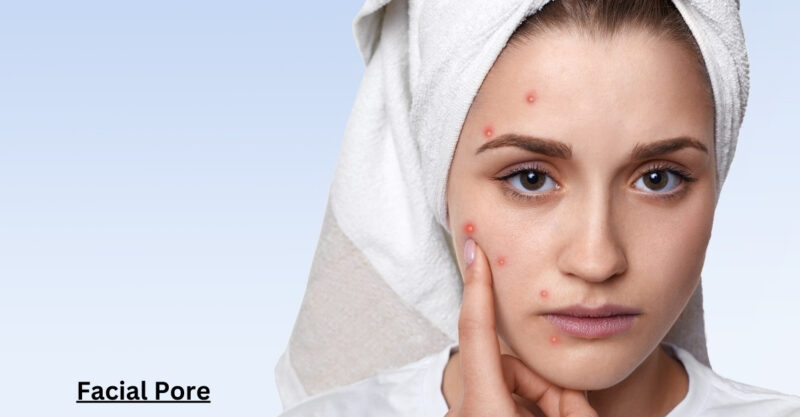Facial Pore, hair follicles and oil glands exit the skin through little holes called pores on the face. Although pores are an inherent component of skin, they can cause a host of skincare issues, such as acne and texture inconsistency, when they get too large or blocked. It is crucial to know what causes facial pores and to have an effective skincare routine if you want to keep your skin healthy and looking attractive.
Understanding the Causes of Facial Pore
Genetic Factors
A person’s genetic makeup greatly influences the size and shape of their face pores. The likelihood of developing enlarged pores increases for those whose families have a history of the condition.
Aging
The skin’s suppleness declines with age, which causes drooping and larger pores. The skin’s structural collagen and elastin fibres can be damaged by long-term sun exposure, which speeds up this process.
Sun Damage
Inflammation and skin hardening brought on by sun exposure can make pores look bigger than they actually are. The accumulation of dead skin cells and extra oil, which the sun’s rays make worse, further enlarges pores.
Hormonal Changes
Increased sebum production and the subsequent widening of face pores can be observed during hormonal swings such as those associated with puberty, pregnancy, and menopause. Hormonal imbalances that lead to acne breakouts can enlarge pores even more.
Different Types of Facial Pore
Enlarged Pores
When pores are enlarged, they show up on the skin’s surface and look like little craters or pits. They show up most frequently on the forehead, cheeks, and nose.
Blackheads
Blackheads develop when the pores of the hair follicles get clogged with sebum and dead skin cells. When this material is exposed to air, it oxidises, giving the skin a dark shade of black and leaving a noticeable mark.
Whiteheads
Whiteheads, occasionally called closed comedones, form when sebum and dead skin cells clog the pores of the hair follicles. A whitehead is a tiny, flesh-colored lump that, unlike a blackhead, stays closed beneath the skin’s surface.
Impact of Facial Pore on Skin Health
Pores that are either too big or too congested can damage the skin in multiple ways:
Acne Development
Pimples, blackheads, and whiteheads develop when oil, dead skin cells, and bacteria build up in the pores, creating an excellent habitat for the germs that cause acne.
Excess Sebum Production
Excess oil production by overactive sebaceous glands is a common cause of enlarged pores. Shiny, greasy skin and acne breakouts are possible outcomes.
Reduced Skin Firmness
The skin structure may become weaker as a result of enlarged pores, which can lead to a loss of elasticity and firmness. Wrinkles, sagging skin, and fine lines may develop as a result of this over time.
Effective Skincare Regimen for Minimizing Facial Pore
To keep pores clear and reduce their appearance, it is vital to maintain a consistent skincare routine.
Cleansing
Impurities like oil, grime, and dead skin cells can clog pores and make them look larger, so it’s important to wash your face regularly to eliminate them. To avoid skin irritation and the worsening of pore troubles, use a mild cleanser that is appropriate for your skin type and refrain from vigorous scrubbing.
Exfoliating
By removing the outer layer of dead skin cells, exfoliation keeps pores clear of buildup. To refine skin texture and clear pores, use a chemical exfoliator with glycolic or salicylic acid.
Using Pore-Minimizing Products
Make use of skincare products that are designed to reduce the visibility of pores. Try to find products that contain niacinamide, retinol, and alpha-hydroxy acids; they will aid in skin tightening and texture refinement.
Professional Treatments for Facial Pore
Professional treatments and skincare therapies can reduce the appearance and size of face pores.
Chemical Peels
To get smoother, more refined pores below, chemical peels use a combination of chemicals that exfoliate the skin. Skin texture, acne, and collagen production can all be improved with their support.
Microdermabrasion
Exfoliating the skin with a handheld device in a gentle manner removes dead skin cells, oil, and debris, a process known as microdermabrasion. Skin tone, texture, and the appearance of enlarged pores can all be improved with this non-invasive technique.
Laser Therapy
Laser treatments, such as intense pulsed light (IPL) therapy or fractional laser resurfacing, constrict enlarged pores and stimulate collagen synthesis by targeting the deeper layers of the skin. Additional benefits of these treatments include a lessening of fine wrinkles, acne scars, and pigmentation.
Natural Remedies for Reducing Facial Pore
To lessen the look of pores on the face, you can try professional treatments as well as a few natural remedies:
Clay Masks
The use of a clay mask, whether made of kaolin or bentonite, can draw out dirt and oil from the skin, making pores appear smaller and less visible. To purify and exfoliate the skin, use a clay mask once every seven days.
Apple Cider Vinegar
The tightening and toning effects of apple cider vinegar, thanks to its astringent qualities, can help diminish the look of enlarged pores. Use a cotton pad to apply a mixture of apple cider vinegar and water to the skin; this will act as a natural toner.
Green Tea
To minimize the appearance of pores, green tea is good because it includes antioxidants and anti-inflammatory components, which help reduce oiliness and inflammation. After steeping some green tea, let it cool and then spritz or use it as a toner for your face.
Preventive Measures to Maintain Healthy Skin and Minimize Facial Pore
If you want to keep your pores from getting larger and your skin looking clear, it’s important to take preventative measures.
Sun Protection
To prevent sun damage and early skin aging, use a broad-spectrum sunscreen daily with an SPF of 30 or higher. Avoid tanning beds, wear protective gear, and go for shade during the sun’s peak hours.
Balanced Diet
Essential elements that promote skin health and reduce inflammation can be found in a well-balanced diet that is high in fruits, vegetables, lean meats, and whole grains. Eating too many processed foods, sweet snacks, and fatty foods can make pore problems worse.
Hydration
In order to maintain soft, supple skin, drink lots of water throughout the day. To keep skin from drying out, flaking, or getting inflamed, it’s important to drink enough water.
Tips for Concealing Facial Pores with Makeup
Makeup may offer short-term coverup and smooth out skin texture, while skincare treatments can reduce the look of pores.
Primer
Before applying foundation, use a pore-minimizing primer to smooth out your skin and hide any visible pores. For a smooth application, use a primer made of silicone to smooth out wrinkles and fine lines.
Foundation
If you want to keep your pores clear and your acne at bay, use an oil-free, lightweight foundation that is appropriate for your skin type. Apply foundation all over your face using a cosmetic sponge or brush, being sure to concentrate on pore-prone regions.
Setting Powder
To set your foundation and mattify your skin, use a translucent setting powder as a finishing touch to your makeup application. To reduce shine and prolong wear, gently push the powder into the skin with a fluffy brush.
Myths and Misconceptions About Facial Pores
Pore Size Can Be Permanently Reduced
Although some skincare procedures and treatments can make pores look smaller, permanently reducing their size is not possible. Pore expansion is normal and unavoidable, and it depends on a variety of factors including genetics, age, and skin type.
Only Oily Skin Types Have Enlarged Pores
Although enlarged pores are more common in oily skin types as a result of increased sebum production, they can also occur in dry or combination skin types. No matter the type of skin, factors like heredity, aging, and environmental damage can affect pore size.
Pores Open and Close
The muscles that give pores their door-like ability to open and close are a common misconception. Factors such as oil production, skin moisture levels, and elasticity dictate whether pores appear open or closed.
Seeking Professional Advice
Talk to a dermatologist or skincare expert for advice and solutions tailored to your unique needs if you’re self-conscious about your pores or are dealing with ongoing skin problems. Based on their evaluation of your skin, they will be able to determine what’s causing your pores to grow and suggest skincare products and treatments that will work best for you.
Conclusion
While pores on the face are an inevitable aspect of the skin’s structure, unattractive enlarged pores or those that become blocked cause a host of skincare problems. Reducing pore size and keeping skin healthy and glowing is possible with an understanding of what causes pores to grow and the implementation of an efficient skincare routine. You may have cleaner, smoother skin and feel better about yourself by making it a daily habit to cleanse, exfoliate, and protect your skin from the sun. If your skin is very problematic, consult a specialist.
FAQs
What causes enlarged pores?
Several factors can cause pores to enlarge, such as hormonal shifts, aging, UV exposure, and genetics.
Can facial pores be completely eliminated?
There may not be a permanent solution to reduce the size of pores, but there are skincare treatments and procedures that can make them look less noticeable.
Are there any home remedies for minimizing pores?
While results may differ, some people have found that using natural therapies like clay masks, apple cider vinegar, and green tea has helped minimize the appearance of pores.
How often should I exfoliate to reduce pore size?
To enhance skin texture and avoid clogged pores, exfoliate twice or three times a week with a mild exfoliator.
Is genetics a factor in pore size?
Heredity mostly determines pore size, but age, sun exposure, and skincare routine can also impact pore appearance.











